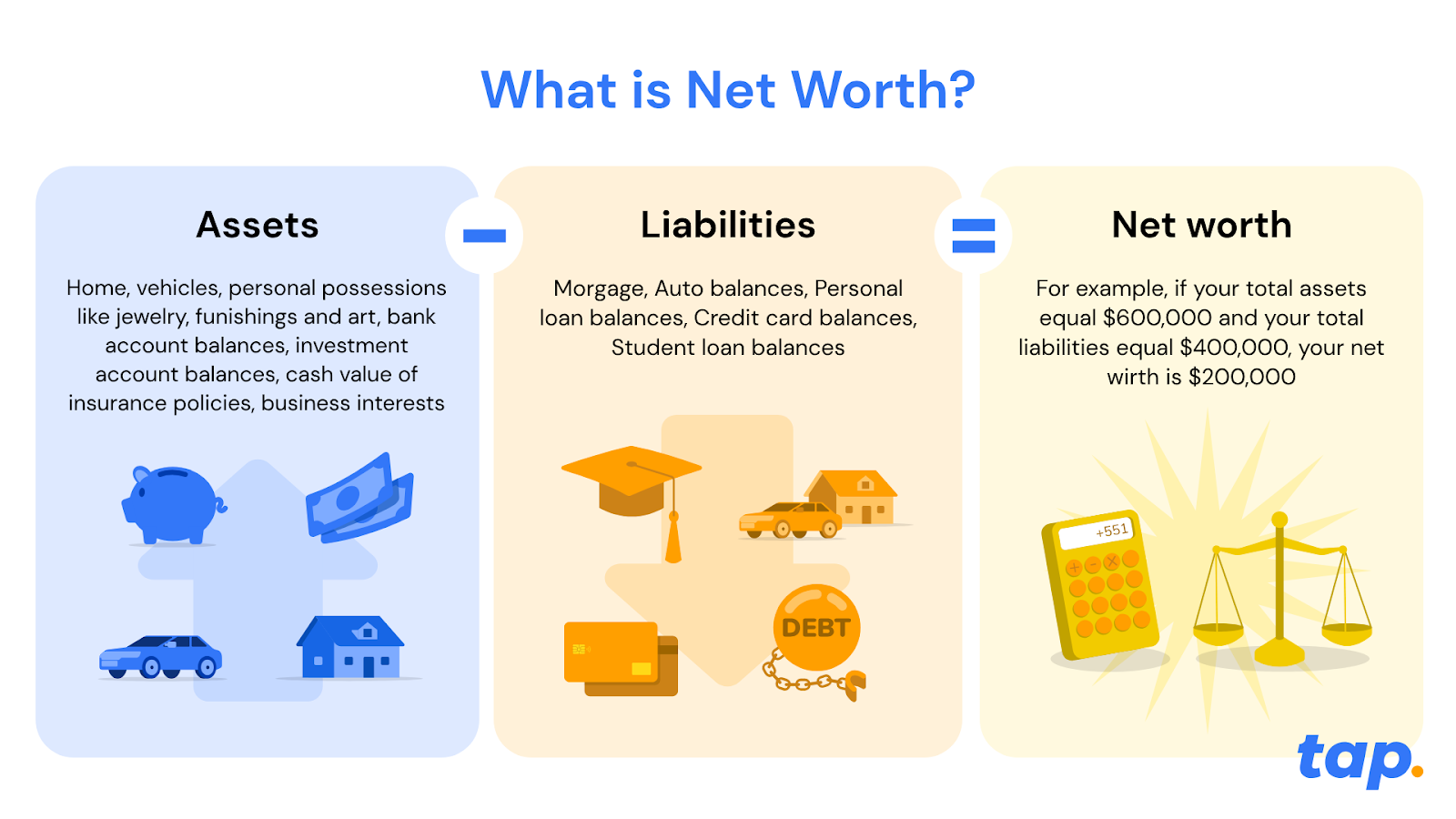Ever wondered if you're winning or losing the money game? Your net worth holds the answer - and it's easier to calculate than you think.
What is net worth? (and why should you care?)
Think of net worth as your financial report card. It's the ultimate measure of your financial health - not how much you earn, but how much you're actually worth.
Here's the simple truth: net worth = what you own - what you owe
Unlike your salary (which just shows your monthly income), net worth gives you the big picture. It's like comparing a snapshot to a full movie of your financial life.

Why net worth beats income every time
You might earn $100,000 a year, but if you owe $150,000 in debt with only $20,000 in assets, your net worth is actually negative $130,000. Meanwhile, someone earning $50,000 with $200,000 in assets and $50,000 in debt has a net worth of $150,000. Who's really ahead?
The net worth formula
Assets (the good stuff you own)
- Real Estate: Your home, investment properties, land
- Investments: Stocks, bonds, mutual funds, crypto
- Retirement accounts: pension funds
- Cash & savings: Bank accounts, CDs, money market accounts
- Valuable possessions: Cars, jewellery, art, collectables
- Business interests: Ownership stakes, equipment
Liabilities (what's draining your wealth)
- Mortgages: Home loans, investment property loans
- Student loans: Education debt
- Credit cards: Outstanding balances
- Auto loans: Car payments
- Personal loans: Any other borrowed money
- Outstanding bills: Medical debt, taxes owed
How to calculate your net worth (3 simple steps)
Step 1: List your assets
Add up everything valuable you own. Be honest but don't undervalue quality items.
Step 2: Total your liabilities
List every debt, loan, and outstanding balance. Yes, even that store credit card.
Step 3: Do the maths
Assets - liabilities = your net worth
Real-world examples: Meet Sarah and Mark
Sarah's success story
Assets:
- Home: $400,000
- Savings: $50,000
- Investment Portfolio: $150,000
- 401(k): $200,000
- Vehicle: $20,000
- Total Assets: $820,000
Liabilities:
- Mortgage: $200,000
- Student Loan: $30,000
- Total Liabilities: $230,000
Sarah's net worth: $590,000
Sarah's doing great! Her assets significantly outweigh her debts.
Mark's comeback journey
Assets:
- Car: $10,000
- Personal Items: $5,000
- Total Assets: $15,000
Liabilities:
- Student Loans: $50,000
- Credit Cards: $8,000
- Medical Bills: $3,000
- Total Liabilities: $61,000
Mark's net worth: -$46,000
Mark has negative net worth, but this is his starting point, not his destiny.
6 reasons why it’s beneficial to grow your net worth
Financial security
Increasing your net worth provides a foundation of financial security. As your net worth grows, you have a greater buffer against unexpected expenses, job loss, or economic downturns. It offers a safety net to navigate through challenging times and helps you maintain stability in your financial life.
Achieving financial goals
A higher net worth enables you to achieve your financial goals and aspirations. Whether it's buying a home, starting a business, funding education, or retiring comfortably, a growing net worth provides the necessary resources and financial freedom to pursue your dreams.
Building wealth
Net worth is a measure of your wealth accumulation over time. By actively growing your net worth, you increase your overall wealth and improve your financial position. It allows you to build a stronger foundation for yourself and potentially leave a legacy for future generations.
Better financial opportunities
A higher net worth opens doors to better financial opportunities. It improves your borrowing capacity, allowing you to secure favourable loan terms and interest rates when needed. Additionally, a strong net worth can attract investment opportunities and partnerships that can further boost your wealth.
Flexibility and choices
Increasing your net worth provides you with more flexibility and choices in life. It affords you the freedom to make decisions based on what aligns with your long-term goals and values, rather than being constrained by financial limitations. A growing net worth expands your options and empowers you to take calculated risks or make life-changing decisions with confidence.
Peace of mind
Knowing that your net worth is growing can bring peace of mind. It reduces financial stress and anxiety, allowing you to focus on other aspects of your life. A positive net worth provides a sense of control over your financial well-being and offers peace of mind that you are on the right track towards a secure financial future.
Tips for increasing your net worth
Boost your income
- Level up your career: Ask for raises, pursue promotions, learn high-value skills
- Create side hustles: Freelancing, online businesses, passive income streams
- Invest in yourself: Education and skills that increase your earning power
Supercharge your assets
- Diversify smartly: Don't put all eggs in one basket
- Think long-term: Focus on assets that appreciate over time
- Get professional help: Financial advisors can spot opportunities you might miss
- Review regularly: Markets change - your strategy should too
Crush your debt
- Target high-interest debt first: Credit cards are wealth killers
- Consider consolidation: Lower interest rates = more money for you
- Create a payoff plan: Set deadlines and stick to them
- Avoid new debt: Unless it's for appreciating assets
Master the long game
- Emergency fund: 3-6 months of expenses (minimum!)
- Retirement planning: Start early, contribute consistently
- Professional guidance: Sometimes paying for advice saves you thousands
- Track progress: What gets measured gets improved
The bottom line: your financial transformation starts now
Your net worth isn't just a number; it's your financial GPS, showing exactly where you stand and where you're headed. Whether you're starting with negative net worth like Mark or building on a solid foundation like Sarah, the principles remain the same.
Remember: Every financial giant started with a single step. Your current net worth is just your starting line, not your finish line.
Start tracking your net worth today, and watch as this simple practice transforms not just your bank account, but your entire relationship with money. Your future self will thank you!
Ready to take control of your financial destiny? Calculate your net worth this week and set your first wealth-building goal. The journey to financial freedom starts with knowing where you stand.
This article is for general information purposes only and is not intended to constitute legal, financial or other professional advice or a recommendation of any kind whatsoever and should not be relied upon or treated as a substitute for specific advice relevant to particular circumstances. We make no warranties, representations or undertakings about any of the content of this article (including, without limitation, as to the quality, accuracy, completeness or fitness for any particular purpose of such content), or any content of any other material referred to or accessed by hyperlinks through this article. We make no representations, warranties or guarantees, whether express or implied, that the content on our site is accurate, complete or up-to-date.




